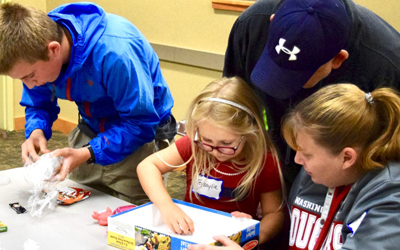 | What Family & Friends Can DoAfter all, what are friends and family for?As a friend or family member, you may know more than most, and in many cases, you’re relied on more than anyone else. Everyone is different, in some cases friends are closer than family, and sometimes, family make up a person’s inner circle. If a friend or family member is having trouble, you may be one of the first to know. |

Listen and Connect
If a friend or family member is struggling, listen, acknowledge their situation and be there for them:
- Parenting is often difficult and asking for help can be hard. Offering help, without judgement, or listening to a parent’s struggles, can provide parents with a sense of support and connection.
- You may be the one to recognize when a child is in danger, or when an adult has mistreated them. Learn how to recognize signs of abuse and how to respond at One with Courage. You can also learn more about how to support a survivor of abuse, neglect or domestic violence at Lutheran Community Services or the YWCA.

Help
You're often the one parents and caregivers turn to when they feel scared, depressed or overwhelmed. You also may share their moments of joy. You see a lot. Here are ways you can help:
- Remember, friendship can blossom anywhere. Get to know your neighbors and offer to help when you can. Establish a relationship with the parents and children living near you and let them know you are there for them, and you care about them. Once you know a family, offer to babysit so that parents can enjoy a night off.
- Alternatively, you can offer to fill in for a friend or family member if they can’t attend a child’s sports event or school play.
- Parenting is hard and can be overwhelming. Be someone that families can reach out to when they are stressed or tired.
- Offer to go on an outing with parents or offer to take young children to the city or county libraries for story time.
- Support parents as decision makers and when possible, help them to build their decision-making and leadership skills.
- Help parents you know by encouraging healthy, effective ways of coping with stress—including learning how to support and protect their children by acting as a buffer during stressful times.

Educate and Share
One way to help friends and family is to point them to the right resources when they need information or assistance. Here are local resources that could be helpful to parents you know:
- Encourage parents in need of assistance to consider the services provided by ParentHelp123 and Catholic Charities Eastern Washington. ParentHelp123 connects families to food and health resources.
- Spokane Regional Health District can also connect families with services including WIC, developmental screenings, information and advocacy for children with special healthcare needs, and home visits for pregnant women.
- Children’s Home Society of Washington can provide family and child counseling, parenting classes, and concrete resources. Offer to contact the group yourself to make reaching out less intimidating.
- For mothers, Spokane Mama offers free meetups and activities just for them.
- Vanessa Behan provides temporary respite care for children and gives families in crisis a network of support. Families can also receive diapers, formula and children’s clothing.

Advocate
Policies impact every aspect of our lives and you can make a difference.
- Check out advocacy resources, such as MomsRising, or the Children’s Alliance for information about ways to support access to things all families need to be resilient and healthy, like safe and affordable childcare for all, consistent work scheduling, leave benefits for all employees or livable wages.
- If you haven’t already, visit the County Elections office in-person or online to register to vote, check your voting status, or update your address.

Learn
Sometimes we’re faced with situations that we don’t know how to address and it can be hard to know how to support an individual experiencing abuse, neglect or domestic violence. Learn about this at Lutheran Community Services or the YWCA. You can also call the National Domestic Violence Hotline at 1.800.799.7233 for more information. The Rape, Abuse and Incest National Network (RAINN) also has a National Sexual Assault Hotline that you can call 24 hours a day, seven days a week at 800.656.HOPE (4673).
